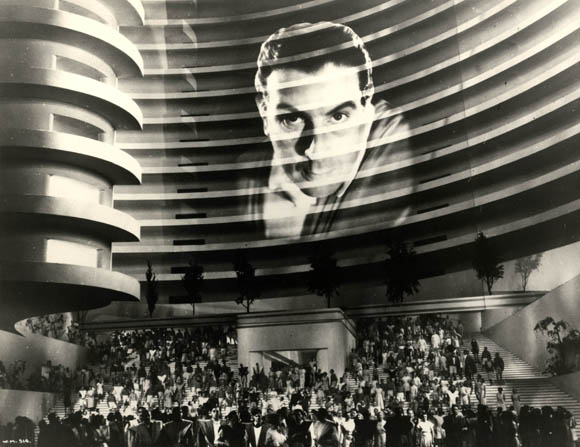William Menzies' Things to Come (1936), with a screenplay by H. G. Wells, is an example of one of the earliest, big budget, studio-produced science fiction films. It presents us with an interesting problem: some aspects of the film seem comically hokey to us now, whereas other parts of the film really do seem to predict the future. The film, written throughout 1934, is notable for predicting World War II, being only 16 months off by having it start on Christmas 1940, rather than 1 September 1939. Its graphic depiction of strategic bombing in the scenes in which Everytown is flattened by air attack and society collapses into barbarism, echo pre-war concerns about the threat of "the bomber will always get through." The film also features a moon launch and large, flat-screen TV monitors (before even clunky TVs were invented, mind you) among other scientific advancements. In short, much of the science fiction seemed spot on.
Charles Silver, curator of the Department of Film at MoMA, goes so far as to argue that Menziies crossed the line into auteurism because of his art direction: "Menzies’s vision of the future features spectacular sets, tempered with throwback tunics reminiscent of the Roman Empire. This seems to have anticipated Michael Anderson’s Logan’s Run (1976), not to mention George Lucas’s Star Wars."
So, how does one evaluate a sci fi film and should it matter if it's 77 years old or not? Before answering, I want you to read how H. G. Wells evaluated another sci fi film the time period. It isn't a very favorible review, but do you think it's a fair one? Please use Wells' review as a springboard into your own ideas about evaluating a sci fi film. By the end of your post, your evaluation of Things to Come should also be clear.

I agree with H.G. Wells when he states that science fiction films are demeaned when they cannot develop an original idea. One of the most admirable things about the genre in my opinion is is the writer and director's abilities to create an entirely new invention, concept, or even universe that no one has yet experienced. However, this loses its appeal when the subject matter or concepts that surround the film become repetitive or copied by other films. We admire the filmmaker's ability to portray his own vision or ideology via fantastical objects, concepts, or characters. Once an idea has been done however it is no longer mind-boggling and innovative, it is merely a lazy spin off of another idea. Things to Come portrays a tall dark and handsome image of the "future" which at the time would have been quite riveting and entertaining to an audience. I feel like this is the main reason why science fiction films today are so intricate and complex. They have to build upon what has already been established and then manage to tack down a new concept that attempts to be more mind-blowing than all of the films that preceded it.
ReplyDelete